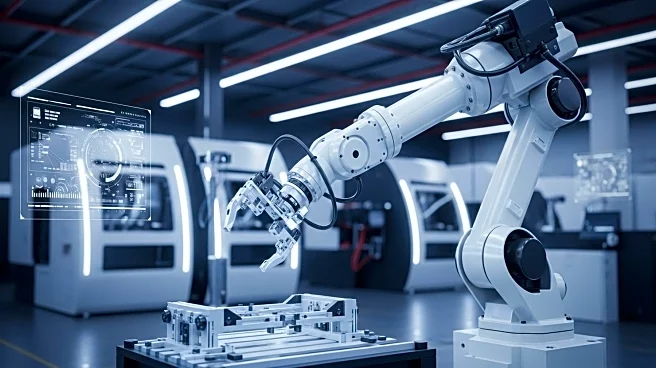What is the story about?
What's Happening?
The integration of SCARA robots into digital manufacturing is becoming increasingly vital as industries strive to maintain operational efficiency amidst evolving technological landscapes. SCARA robots, known for their flexibility and precision, are being adopted to address challenges such as labor shortages and rising operational costs. These robots incorporate advanced technologies like artificial intelligence and big data analytics, enhancing their ability to perform high-speed, repetitive tasks with accuracy. The demand for SCARA robots is driven by the need for manufacturers to adapt quickly to changing market demands and workforce dynamics, ensuring consistent productivity and quality in production lines.
Why It's Important?
The significance of SCARA robot flexibility lies in its ability to mitigate the impact of labor shortages and rising costs in the manufacturing sector. As customer expectations for speed and accuracy increase, manufacturers face pressure to enhance operational efficiency. SCARA robots offer a solution by improving throughput and reducing labor costs, which is crucial for maintaining competitiveness in a rapidly evolving market. The adoption of these robots is expected to grow, with the global market projected to reach $15.6 billion by 2032. This growth underscores the importance of technological modernization in meeting customer demands and sustaining industry competitiveness.
What's Next?
Manufacturers are likely to continue investing in SCARA robots to stay ahead in the competitive market. As the technology evolves, decision-makers must carefully evaluate factors such as repeatability, payload capacity, and support requirements to ensure optimal performance. The availability of training and technical support will play a crucial role in the successful implementation of these robots. Additionally, the ongoing development of cutting-edge robotics will drive further advancements in production efficiency, potentially leading to new innovations in digital manufacturing processes.
Beyond the Headlines
The adoption of SCARA robots highlights broader trends in industrial automation, including the shift towards more flexible and efficient manufacturing processes. This transition may lead to long-term changes in workforce dynamics, as automation reduces reliance on manual labor and reshapes job roles within the industry. Ethical considerations regarding the displacement of workers and the need for reskilling initiatives may arise as automation becomes more prevalent. Furthermore, the emphasis on technological innovation could spur advancements in related fields, such as artificial intelligence and data analytics, further transforming the manufacturing landscape.















